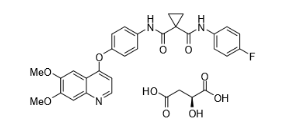The government is now operating in accordance with the Guidance on Caretaker Conventions, pending the outcome of the 2025 federal election.
Scheduling proposal
The delegate considered an application from the Therapeutic Goods Administration (TGA) for the scheduling of cabozantinib, a new chemical entity (NCE) for a human therapeutic medicine.
Substance summary
Cabozantinib is a small molecule that inhibits multiple receptor tyrosine kinases (RTKs) implicated in tumour growth and angiogenesis, pathologic bone remodelling, drug resistance, and metastatic progression of cancer. Cabozantinib was evaluated for its inhibitory activity against a variety of kinases and was identified as an inhibitor of MET (hepatocyte growth factor receptor protein) and VEGF (vascular endothelial growth factor) receptors. In addition, cabozantinib inhibits other tyrosine kinases including the GAS6 receptor (AXL), RET, ROS1, TYRO3, MER, the stem cell factor receptor (KIT), TRKB, Fms-like tyrosine kinase-3 (FLT3), and TIE-2.
Cabozantinib is indicated for the treatment of advanced renal cell carcinoma (RCC) in adults following prior therapy.
| Property | Cabozantinib |
|---|---|
| CAS number | 1140909-48-3 |
| Chemical structure |  |
| Molecular formula | C28H24FN3O5C4H6O5 |
| Molecular weight | 635.6 Daltons as malate salt |
| Chemical names | N-(4-(6,7-dimethoxyquinolin-4-yloxy)phenyl)-N'-(4fluorophenyl)cyclopropane-1,1-dicarboxamide, (2S)-hydroxybutanedioate |
| Other names | 111248 (eBS ID); cabozantinib (S)-malate (ANN and IIN (modified)) |
Scheduling status
Cabozantinib is not specifically scheduled and is not captured by any entry in the Standard for the Uniform Scheduling of Medicines and Poisons (SUSMP) – the Poisons Standard that was in effect at the time the decision was made (Poisons Standard October 2017 (SUSMP No. 18)).
International regulations
Cabozantinib is classified as a prescription only medicine in the United States of America, the European Union and the United Kingdom and is not classified in New Zealand or Canada.
Delegate’s consideration
The delegate decided to make a delegate-only decision. The Advisory Committee on Medicines Scheduling was not consulted.
The delegate considered the following in regards to this application for scheduling:
- Subsection 52E(1) of the Therapeutic Goods Act 1989;
- The Scheduling Policy Framework (2015) scheduling factors;
- The TGA evaluation report; and
- The new drug application.
The delegate noted that currently there are no issues of concern that require additional control other than by inclusion in Schedule 4.
Delegate’s final decision
The delegate has made a final decision to amend the Poisons Standard to include cabozantinib in Schedule 4, with an implementation date of 1 February 2018.
The delegate has decided that the wording for the schedule entry will be as follows:
Schedule 4 – New Entry
CABOZANTINIB.
The delegate decided that the relevant matters under subsection 52E(1) of the Therapeutic Goods Act 1989are: (a) the risks and benefits of the use of a substance; and (c) the toxicity of a substance.
The delegate decided that the reasons for the final decision comprise the following:
- Cabozantinib is an NCE with no marketing experience in Australia.
- Cabozantinib has significant capacity for toxicity without benefit outside its proposed usage.



